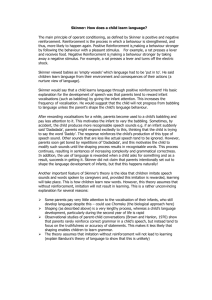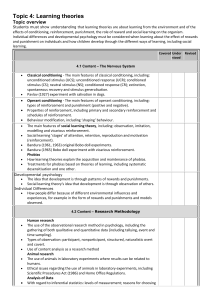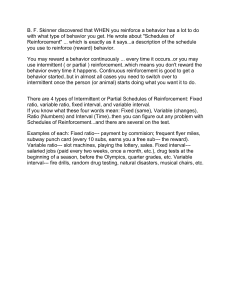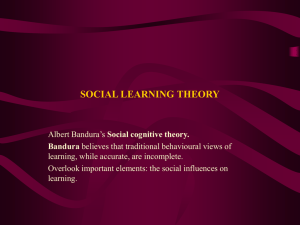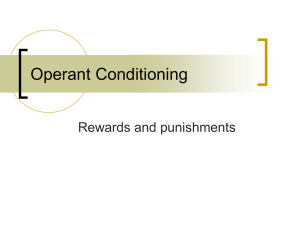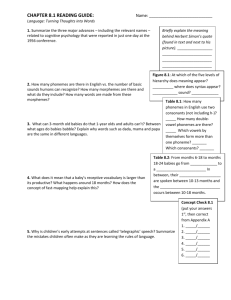F920 Language development - theories etc
advertisement
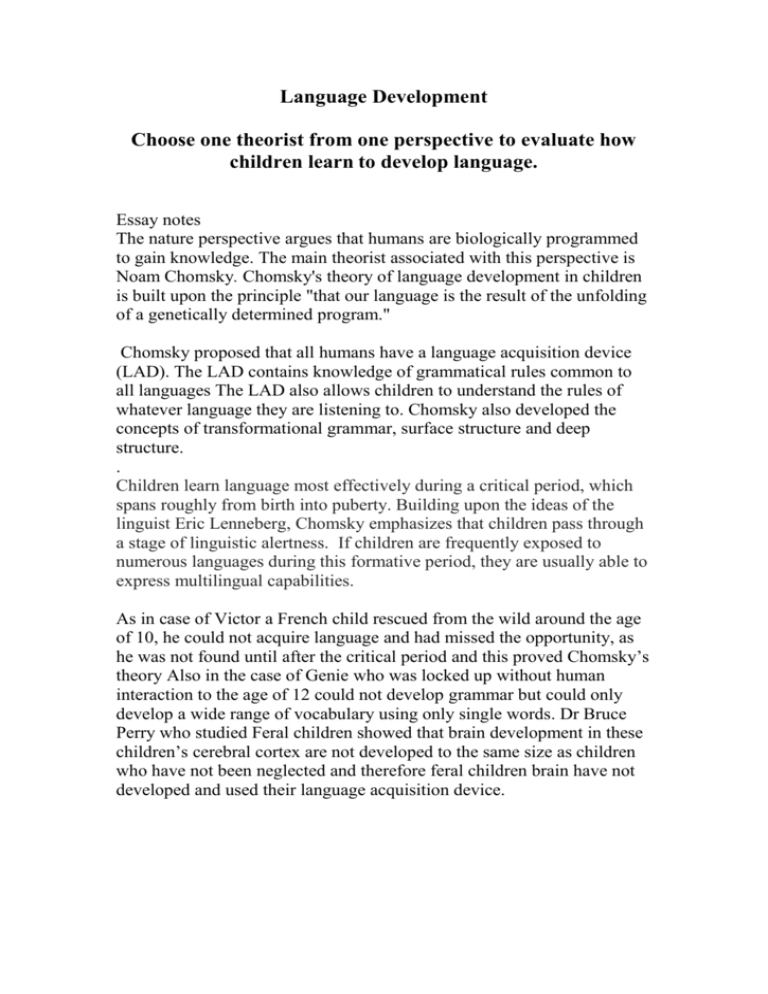
Language Development Choose one theorist from one perspective to evaluate how children learn to develop language. Essay notes The nature perspective argues that humans are biologically programmed to gain knowledge. The main theorist associated with this perspective is Noam Chomsky. Chomsky's theory of language development in children is built upon the principle "that our language is the result of the unfolding of a genetically determined program." Chomsky proposed that all humans have a language acquisition device (LAD). The LAD contains knowledge of grammatical rules common to all languages The LAD also allows children to understand the rules of whatever language they are listening to. Chomsky also developed the concepts of transformational grammar, surface structure and deep structure. . Children learn language most effectively during a critical period, which spans roughly from birth into puberty. Building upon the ideas of the linguist Eric Lenneberg, Chomsky emphasizes that children pass through a stage of linguistic alertness. If children are frequently exposed to numerous languages during this formative period, they are usually able to express multilingual capabilities. As in case of Victor a French child rescued from the wild around the age of 10, he could not acquire language and had missed the opportunity, as he was not found until after the critical period and this proved Chomsky’s theory Also in the case of Genie who was locked up without human interaction to the age of 12 could not develop grammar but could only develop a wide range of vocabulary using only single words. Dr Bruce Perry who studied Feral children showed that brain development in these children’s cerebral cortex are not developed to the same size as children who have not been neglected and therefore feral children brain have not developed and used their language acquisition device. Language is developed in stages, they are the prelinguistic stage at new born where sounds and noises are gurgling and babbling. The next stage is the holophrase which leads up to around 12 months where single words have range of meanings, used with purpose. The telegraphic is the stage when the child will use abbreviated phrases used with meaning e.g ‘doggie gone’ and understands a wide range of vocabulary up to approx 2 yrs the next stage is developing grammar and complex sentence structure. Between approx 2-3 yrs there is an extended use of language where the child can enjoy jokes, nonsense words etc –this is known as metalinguistics. From 4 years language is used creatively and fluently. Skinner and other reinforcement nurture theorists believe that interactions are crucial for language development. In the case of Oxana Malaya in the Ukraine who lived with her dog she did hear some conversations and was able to develop language when rescued. The nurture theorists believe there are many factors which need to be present for children to develop language Firstly, babies need to be spoken to and communicated with. The Baby Talk Register (BTR) where babies need to hear and answer speech and language and have conversations going on around them. Babies need to have opportunities for individual focus and attention – eye contact, facial expression etc Babies need to be encouraged to respond with positive feedback according to Skinner and children need to be given opportunities to practice language in a supportive environment, listened to, allowed to make mistakes and encouraged to ask questions. Reading and story telling contributes to development of understanding of grammar, use of language etc However factors that inhibit language development could be lack of stimulation – not being spoken to, listened to or read to. Deprivation and neglect as in the case of feral children of extreme cases of isolation. Poor parenting and abuse could contribute to poor language development. Disruption in family life and frequent changes of carer could be a factor as well as a lack of opportunity to practice where a noisy environment, surrounded by TV, music or lack of specific conversation with a child. Children could live in a stressful home where there is excessive correction and pressure leading to anxiety in use of language and sense of failure within the child. Finally a disability such as visual and hearing impairment or learning difficulties could affect language development. Conclusion – linked to question asked Introduction Behavioural perspective The Behavioural perspective argues that children imitate what they see and hear and that children learn from punishment and reinforcement The main theorist associated with the learning perspective is B.F. Skinner. Skinner argued that adults shape the speech of children by reinforcing the babbling of infants that sound most like words. Skinner’s theory is based on operant conditioning is a type of learning in which behaviour is determined by its consequences. (Strengthened if followed by reinforcement [positive or negative] and diminished if followed by punishment. A stimulus gives a response (S-R bond), this is how speech develops. Skinner views the child as the "passive subject of operant conditioning in whom randomly occurring behaviour is selectively reinforced" Features Reinforcement of an operant behaviour is the key to conditioning taking place. He believed that children learn language through reinforcement, parents provide attention and pleasurable reactions when correct sounds are made, a child will repeat verbal behaviour that is rewarded and drop sounds that does not get positive reactions. Social environment influences the ability to communicate effectively. A positive reinforcement occurs when a behaviour (response) is strengthened because it is followed by a rewarding stimulus – give example By contrast, a negative reinforcement occurs when a behaviour (response) is strengthened because it is followed by the removal of an aversive stimulus – give example Both types of reinforcement strengthen behaviour, or increase the probability of a behaviour reoccurring; the difference is in whether the reinforcing event is something applied (positive reinforcement) or something removed or avoided (negative reinforcement). Include all the following key words operant conditioning positive reinforcement/praise/reward leads to behaviour being repeated negative reinforcement – avoiding unpleasant situation leads to unwanted behaviour being ‘extinguished’. based on work with pigeons/rats . focus on desired behaviour ignore unwanted behaviour care needed with punishment Genie – case study of a feral child http://en.wikipedia.org/wiki/Genie_(feral_child) Cultural differences, differences in dialect and accent show the importance of social environment being a major influence on language development. Good example is Genie who was isolated, she heard no speech and understood no language, when she was found could make only biological noises, however when she was fostered she learned to speak more easily, but never developed in the normal way, this would conclude that social interaction is vital and therefore nurture. The evidence however is inconclusive. Criticisms of this theory The main criticism of this theory is that it does not consider any aspect of maturation and the biological view that we have an innate ability to learn language. The nature perspective argues that humans are biologically programmed to gain knowledge. The main theorist associated with this perspective is Noam Chomsky. Skinner's `finite grammar' was far too limited in it's application. Another criticism shows that children must go through the stages of maturity before they can actually learn. A certain level of development of the nervous system needs to occur before actual language development can take place. A child needs to develop the capability to learn first. The limitations of operant conditioning are that mental and emotional events are ignored. Skinner regarded emotions as responses to behaviour and not causes of behaviour. As such Skinner thought that behaviour could only be changed by reinforcement or punishment, and not by analysing emotions. E.g. angry or joy Conclusion It has been proved that language is learnt through trial and error. The actual sounds, words and grammar that children learn will depend on their environment, e.g. different cultures. The speed at which children learn will also be influenced by their environment. Interaction with parents and others, parents and others positively reinforce good speech and learn through copying and imitation through repetitions, pick up accent and dialect and language. However there is a debate on nature or nurture affects speech development, dialect and accent differences may suggest that it is nurture however stages suggest maturation, perhaps it is a mixture of the two.
